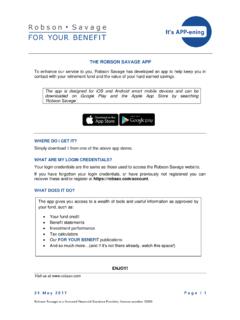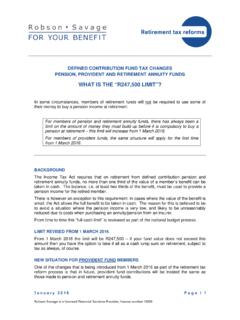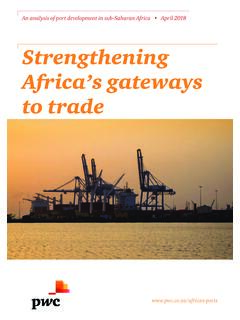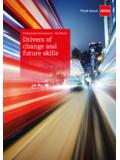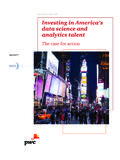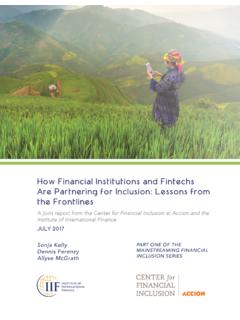Transcription of STEINHOFF SHARE PRICE COLLAPSE - Robson Savage
1 11 December 2017 Page | 1 Robson Savage is a licensed Financial Services Provider, license number 16359 STEINHOFF SHARE PRICE COLLAPSE By now most of you will be aware of the sharp fall in the STEINHOFF SHARE PRICE last week. This note briefly explains what happened and how it may affect your savings. WHAT HAPPENED? The sell-off was precipitated by the sudden resignation of the company s long-time CEO Markus Jooste last week following an announcement by the company of possible accounting irregularities (and even rumours of possible fraudulent activities). The 2017 financial statements, due to have been released on 6 December 2017, have been indefinitely delayed, with PWC appointed to perform an independent investigation.
2 While the purpose of this note is not to expand too much on the details of the irregularities (much of this has been covered by the media) it essentially boils down to allegations that, through various means, the company s assets have been overstated, its expenses understated, losses obscured and its earnings therefore artificially boosted. The expectations are however that these issues mainly affect the company s European operations. At this stage there is still a lot of uncertainty and the exact extent of the potential losses remains unknown.
3 This has made it near impossible to accurately determine a fair value for the SHARE . The market has punished STEINHOFF severely, with the PRICE of ordinary shares down by almost 90% since the end of November: STEINHOFF hassles Page | 2 The jury is still out on whether markets have overreacted (as markets tend to do most traders will sell first and ask questions later) or if this will turn out to be another african Bank or Enron scenario. WHAT HAS BEEN THE IMPACT ON RETIREMENT SAVINGS? Understandably members are concerned about the impact of STEINHOFF on their retirement savings.
4 STEINHOFF is a large-capitalisation SHARE that is widely held by the market, very often for its growth and rand hedge qualities. At the end of November, this SHARE made up approximately 3% of the widely followed FTSE/JSE Shareholder Weighted Index, making it one of the ten largest shares in this index. Given the popularity of this SHARE , most members will be affected. While not exhaustive, the table in the appendix shows the approximate holdings in STEINHOFF across a number of our clients more popular portfolios. As can be seen from these figures, the exposures to STEINHOFF are relatively small (we have not yet come across a retirement fund portfolio in our client base that has an equity holding larger than 3% of its assets).
5 Risk management plays an important role in any well-managed fund, and diversification ( not having all of your eggs in one basket) is one of the tools used by investment managers to minimise risk and losses. While any loss (no matter how small) is no doubt concerning, the impact on fund returns should be limited. WHAT ACTION HAS INVESTMENT MANAGERS TAKEN? Most managers (including Abax, Allan Gray, Coronation, Foord and Investec) have not sold out of their holdings. They are reluctant to realise permanent capital losses in this uncertain environment. Some managers (Allan Gray is a notable example here) have actually taken advantage of the sell-off to increase their exposure.
6 It should be noted that compared to most other managers Allan Gray had a relatively small (and recently initiated) position in this company to begin with. A smaller number of managers (including Electus, Element and Prudential) have decided to cut their losses and have completely sold out of their positions. This will obviously have locked in some of the losses, but we will only know whether this was a wise move once we have seen how matters unfold. SHOULD INVESTMENT MANAGERS HAVE SEEN THIS COMING? This is a difficult question to answer. Investment managers have to depend on publicly available information, such as a company s audited financial statement and SENS announcements.
7 Interaction with company management teams, suppliers and competitors is another useful source of information. STEINHOFF is a very complex business, with operations across many industries and jurisdictions. Their highly acquisitive nature, combined with aggressive tax and accounting practices have been a source of concern for a number of years now, but many investment managers have been bullish on the company s growth prospects regardless. These managers believe that STEINHOFF has in recent times traded well below their assessment of intrinsic value, even after discounting for the abovementioned factors.
8 Even highly regarded managers that had no STEINHOFF exposure (or were severely under-weight) humbly admit that they did not expect to see this level of fallout. What is interesting is that two prominent company directors (Chairman Christo Wiese and CFO Ben la Grange) entered into significant positions in STEINHOFF as recently as early November (Wiese for about R120m and La Grange for around R4m). In addition, STEINHOFF itself bought back around 78 million of its own shares at the end of October. In total, Page | 3 executive management and the board collectively own nearly 30% of the company, which gave many investment managers further comfort.
9 The media is of course rife with examples of people who, with the benefit of hindsight, claim to have been aware of the extent of STEINHOFF s potentially significant issues all along. While it is believable that many may have had their suspicions, we have not seen any high-profile and detailed expos s BEFORE the events of this week. The observation that so many experienced investment professionals and company insiders did not foresee this, must at least cast some doubt on these claims. As always, one should consider the complete track record of anyone claiming to have any special insights.
10 Remember, good long-term results do not result from getting one call right. It stems from getting more calls right than wrong, consistently, over long periods of time. IS THERE ANY VALUE LEFT? While we have been canvassing the opinions of many investment managers, this is arguably an even more difficult question to answer, at least until audited financial statements are released. There are many conflicting viewpoints, but STEINHOFF has substantial stakes in a number of well-run businesses such as STEINHOFF Retail Africa (the owner of a number of iconic retail brands), PSG and KAP, a sizable property portfolio as well as other unlisted assets which may serve to underpin its valuation.
